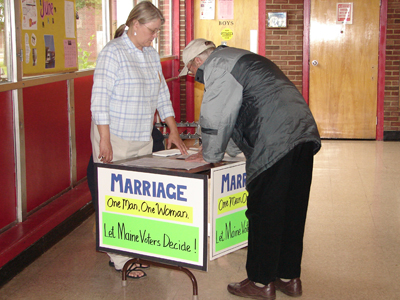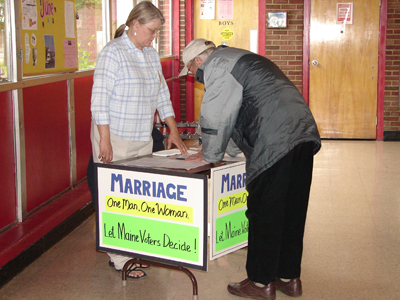
(RNS2-JUNE08) A voter in Brunswick, Maine, signs a petition to overturn a state law that legalized same-sex marriage. Conservative groups have successfully fought same-sex marriage through voter initiatives. For use with RNS-BALLOTS-GAYS, transmitted June 8, 2009. Religion News Service photo courtesy Miriam Conners/StandForMarriageMaine.com

(RNS2-JUNE08) A voter in Brunswick, Maine, signs a petition to overturn a state law that legalized same-sex marriage. Conservative groups have successfully fought same-sex marriage through voter initiatives. For use with RNS-BALLOTS-GAYS, transmitted June 8, 2009. Religion News Service photo courtesy Miriam Conners/StandForMarriageMaine.com
(UNDATED) The ink had barely dried on Maine Gov. John Baldacci’s signature legalizing gay marriage in May when Catholic and evangelical opponents began circulating a petition for a “people’s veto” to override lawmakers with a simple majority at the ballot box.
In Iowa, where the state Supreme Court legalized gay marriage in April, activists are pursuing a constitutional amendment that could get the issue in front of voters as soon as 2012.
And in New Hampshire, where Gov. John Lynch recently signed a bill to make the Granite State the sixth state to allow gay marriage, social conservatives hope to put the issue on town meeting ballots across the state next year in a bid to document widespread dissent.
The message coming from gay marriage opponents is clear: pillar institutions of American democracy — first, the courts and, now, lawmakers — are hopelessly compromised and not to be trusted, at least not with one of the biggest social issues of our time.
Stunned by four states legalizing same-sex marriage in just two months, social conservatives are working hard to stop it, often through the avenue where they’ve had their greatest success: the ballot box.
While some political observers say the tactic might be a risky one, advocates for traditional marriage say they need to pull out all the stops.
“The integrity of our most fundamental institutions is in question and needs to be in question,” says Mike Heath, executive director of the Maine Family Policy Council, an evangelical Christian lobbying group.
“I see our institutions as having become openly hostile (to religious views). They’re responsive to the elite and moneyed interests that dominate our statehouse. … The only hope here is the people.”
Reason No. 1 for turning to the ballot box? It works.
To date, state constitutional bans on gay marriage have passed in all 30 states where they’ve appeared on the ballots. “I’m getting (the marriage issue) before the people as often as I can,” said Maggie Gallagher, president of the National Organization for Marriage, a pro-traditional marriage group.
Lawmakers in eight more states tried to move similar measures this year, although none received the legislative green light to advance to the ballot box, according to Christine Nelson, policy analyst for same-sex marriage issues at the National Conference of State Legislatures.
Conservatives say they recognize the need to explain not only banning gay marriage but also why they’re choosing to push the issue through the ballot. After all, they’ve agreed to live with legislative and judicial decisions on other hot-button issues, from abortion to religious freedom, even when those decisions haven’t gone their way.
Some argue that gay marriage is so unusual that it requires uncommon measures.
“Some cases that the courts decide are not brought to the people because people can actually see a rationale that the courts give to decide a particular case,” says Kevin Smith, executive director of Cornerstone Policy Research, a conservative advocacy group with a New Hampshire focus.
“I don’t think the pro-marriage folks can see any rationale for saying that same-sex couples have the right to marry. … The courts haven’t touched on the question of: `Why do we have marriage in society and what’s the purpose of it?’ We think it’s just a really shallow argument from the courts.”
The marriage issue is just the latest part of a broader critique of particular branches of American government. In Maine, Heath challenges the integrity of heavily-lobbied lawmakers, where he says both parties are “are at best uninterested in serious, meaningful, theological and moral discussion … of issues related to marriage, sexuality and family formation.”
In Iowa, charges center on a judiciary that critics say overstepped its authority and needs to be put back in its proper place. By seeking a popular vote for a constitutional amendment, activists hope to set a precedent with implications for how to handle other issues.
“We don’t have to follow the model that was set before” when abortion opponents accepted Roe v. Wade as law of the land and then “legislated around the edges,” says Bryan English, spokesman for the Iowa Family Policy Center, a conservative Christian lobbying group. “The path that they took did not bring an ultimate end to abortion yet. We have a responsibility … to preserve the liberty that comes from separation of powers and vesting of political power ultimately in the people.”
The strategy is not without complications, however, said David Woodard, a political scientist at Clemson University. Consistency might require conservatives to view “compromised” institutions as unfit to handle a whole range of issues, not just gay marriage, he said. Otherwise, groups can appear opportunistic and only concerned with winning certain issues in certain ways.
Another risk: voters might actually support gay marriage in the voting booth. A recent Brown University poll found 60 percent of Rhode Island voters favor same-sex marriage in the only New England state that does not allow it. That’s what leads Heath to fear that “we are probably going to lose and (gay groups) are going to get marriage at the national level.”
Yet despite the risks, Woodard says gay marriage opponents can’t afford to forgo a direct appeal to voters.
“The alternative is sitting there and sort of passively being dominated by a cultural minority that really can undermine your whole faith — not just your personal beliefs, but also your family and future generations,” he said. “The alternative of being quiet is almost unthinkable in a context where you feel threatened and where, if you just sit there any longer, there’s no telling what could happen.”




